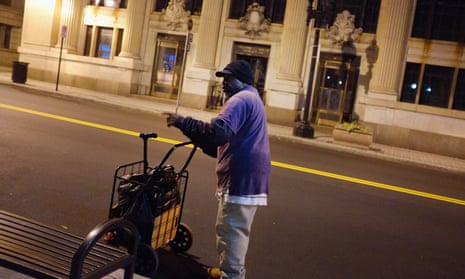Last February, the coldest on record for the state of Connecticut, Jack Jakups and his girlfriend, Shannon McLaughlin, lived in a tent on the banks of the Connecticut River in Hartford.
At night, they burrowed beneath piles of blankets with their dog, Cookie. During the day, they looked for warm food and a place to recharge their cellphones. Sometimes, they’d get a little money together and indulge in a few days in a cheap motel where they’d do their laundry, up to 17 loads at a time.
Just a regular bad-luck story in the land of opportunity, right? Except that’s all behind them now. Jakups – known as “Boogie” for his distinctive walk – McLaughlin and Cookie have moved into a one-bedroom apartment just two miles from where they once shivered under blankets. They were among the more than 400 people around Connecticut who were housed or matched to housing during an innovative initiative known as the 100-Day Challenge.
A joint public-private venture, the four-month challenge, which ended in June, included 140 agencies and providers and touched nearly 85% of the state’s homeless population. Activists, advocates and others cooperated in an unprecedented way to use already-existing resources to get people like Jakups and McLaughlin into apartments.
Sound simple? It is. Just as the answer to hunger is food, the answer to homelessness is homes.
It costs more to keep people on the streets than it does to house them and provide any support services they may need. People who live on the streets don’t get preventative medical care. They wait for a medical crisis and then go to a local emergency department, where care is most expensive. The rest of us pay for that healthcare at a premium. People who are homeless spend more time in the hospital, and more time in jail. All this costs public funds. Studies from New York to California show that permanent supportive housing costs less in the long run.
But the traditional US response to homelessness is to treat it as an emergency situation that needs a band-aid fix, putting people in temporary shelter until permanent housing turns up. This system is significantly flawed and bureaucracy-clogged. Some people can’t get matched for housing because they lack proper identification. Much of the front-line work is done by nonprofits, which by necessity devote at least some staff to the search for public and private funding for their work rather than to housing efforts. People sometimes waited years to get housed – and by the time a home becomes available, oftentimes members of this fluid population have moved on.
Cycling and recycling people who are homeless through the shelter system doesn’t allow them to build a foundation. And even people who have a cornerstone of stability – a job – can’t afford a home. An annual study from the National Low Income Housing Coalition says the nation’s so-called housing wage – the amount of money a worker must earn per hour to afford a decent apartment, is $19.35 for a two-bedroom apartment, and $15.50 for a one-bedroom. A worker earning the federal minimum wage of $7.25 per hour can’t possibly afford a place to live.
In fact, nowhere in the US can minimum-wage workers afford a one-bedroom rental unit without spending far more than 30% of their income on housing, the cutoff suggested by the federal Department of Housing and Urban Development. Paying more than that makes purchasing other necessities – such as food and healthcare – difficult.
It’s better to house them. Liberal Connecticut knows this. So does Utah, a state that is far more conservative. Until other states catch up, we can count on continued homelessness, and on the US being something slightly less than the land of opportunity.
